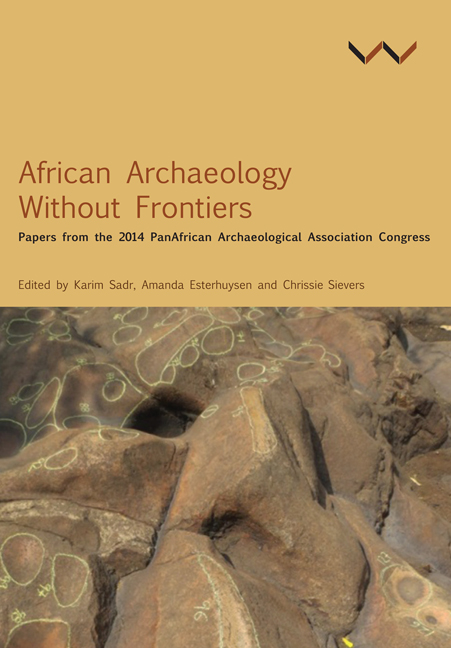 African Archaeology Without Frontiers
African Archaeology Without Frontiers Book contents
- Frontmatter
- Contents
- Acknowledgements
- List of Figures and Tables
- Introduction: An Invitation Fulfilled
- Keynote Address 1: Imagining an African Archaeology Without Frontiers
- Keynote Address 2: A Continental Vision for African Archaeology
- 1 The ‘Useable’ Archaeology of African Farming Systems
- 2 Defining Cultural Heritage among the Makonde of Tanzania
- 3 The Indigenous Roots of Swahili Culture in Pangani Bay, Tanzania
- 4 Is This an Anvil? Iron Bloom Crushing Sites in Northern Togo
- 5 L'art Rupestre au Cameroun, Nouvelles Découvertes et Contribution à L'iconographie Sous-Régionale
- 6 Archaeology and History in Iron Age Settlements in the Congo Basin
- 7 Learning from Glass Trade Beads at Thabadimasego, Botswana
- 8 Blurring Boundaries: Forager–Farmer Interactions in the Middle Limpopo Valley
- 9 Heritage Management and the World Wide Web: South African Challenges
- Contributors
- Index
Introduction: An Invitation Fulfilled
Published online by Cambridge University Press: 15 March 2018
- Frontmatter
- Contents
- Acknowledgements
- List of Figures and Tables
- Introduction: An Invitation Fulfilled
- Keynote Address 1: Imagining an African Archaeology Without Frontiers
- Keynote Address 2: A Continental Vision for African Archaeology
- 1 The ‘Useable’ Archaeology of African Farming Systems
- 2 Defining Cultural Heritage among the Makonde of Tanzania
- 3 The Indigenous Roots of Swahili Culture in Pangani Bay, Tanzania
- 4 Is This an Anvil? Iron Bloom Crushing Sites in Northern Togo
- 5 L'art Rupestre au Cameroun, Nouvelles Découvertes et Contribution à L'iconographie Sous-Régionale
- 6 Archaeology and History in Iron Age Settlements in the Congo Basin
- 7 Learning from Glass Trade Beads at Thabadimasego, Botswana
- 8 Blurring Boundaries: Forager–Farmer Interactions in the Middle Limpopo Valley
- 9 Heritage Management and the World Wide Web: South African Challenges
- Contributors
- Index
Summary
Amanda Esterhuysen, Karim Sadr and Chrissie Sievers
African archaeology in the twenty-first century is challenged to transcend not only national and linguistic boundaries that separate scholars and researchers, but also disciplinary boundaries between archaeology and the many other fields of study that can enrich our understanding of the past, as well as the artificial boundaries within archaeology itself, such as those drawn between the study of different ‘ages’ that should not be understood in isolation. These and other issues are among the topics addressed in this edited collection of papers drawn from the proceedings of the landmark 2014 PanAfrican Archaeological Association of Prehistory and Related Studies Congress. Held in Johannesburg nearly seven decades after the conference planned for 1951 was relocated to Algiers for ideological reasons following the National Party's rise to power in South Africa, the 2014 meeting marked a historic return to the southern tip of the continent and provided an opportunity for professional African archaeologists to showcase the value of archaeology and related disciplines in foregrounding African cultural values and historical achievements.
The first PanAfrican Congress for Prehistory and Related Studies was, according to Mary Leakey, ‘very much Louis's brainchild’ (1984: 91). Louis Leakey conceived of the conference in 1944 and solicited support from colleagues in South Africa, England and later France. In his memoirs he reflected that he felt strongly that the ‘moment was most opportune to inaugurate a pan-African congress of prehistory’ (1974: 193). It was an exciting time in history, full of the promise of change, and Leakey would no doubt have been aware of the political momentousness of the pan-African movement that held its fifth congress in Manchester, England, immediately after the war. Many key African leaders attended this congress, and there was a strong feeling among Africans and people of African descent that liberation, freedom and pan-Africanism were ‘idea[s] whose time had come’ (Abrahams 1947: 11). Leakey would also have taken cognisance of the formation of the United Nations Educational, Scientific and Cultural Organisation in 1946. The organisation specifically promoted the role that science could play in promoting peace and security and it provided a platform for scientists to dispel the biological myth of race and to question racism.
- Type
- Chapter
- Information
- African Archaeology Without FrontiersPapers from the 2014 PanAfrican Archaeological Association Congress, pp. xv - xxPublisher: Wits University PressPrint publication year: 2016


